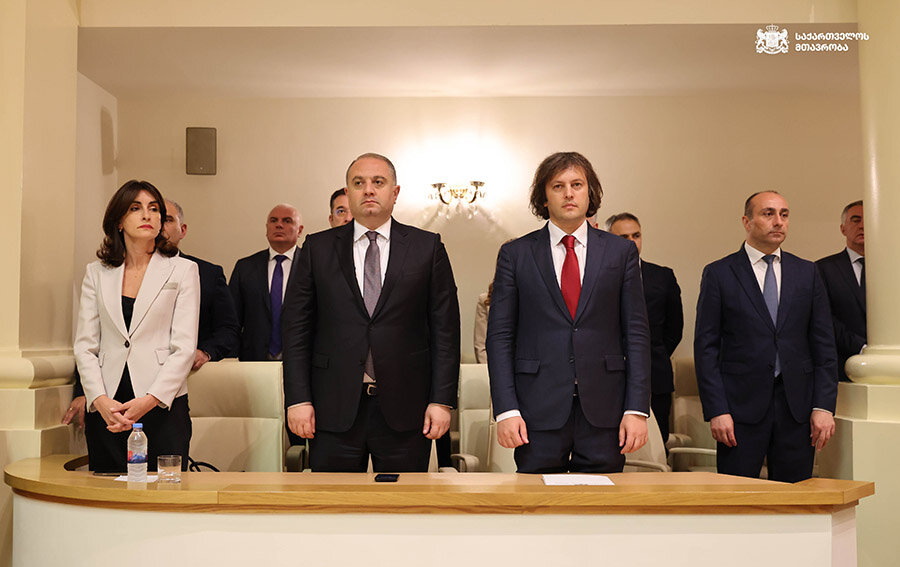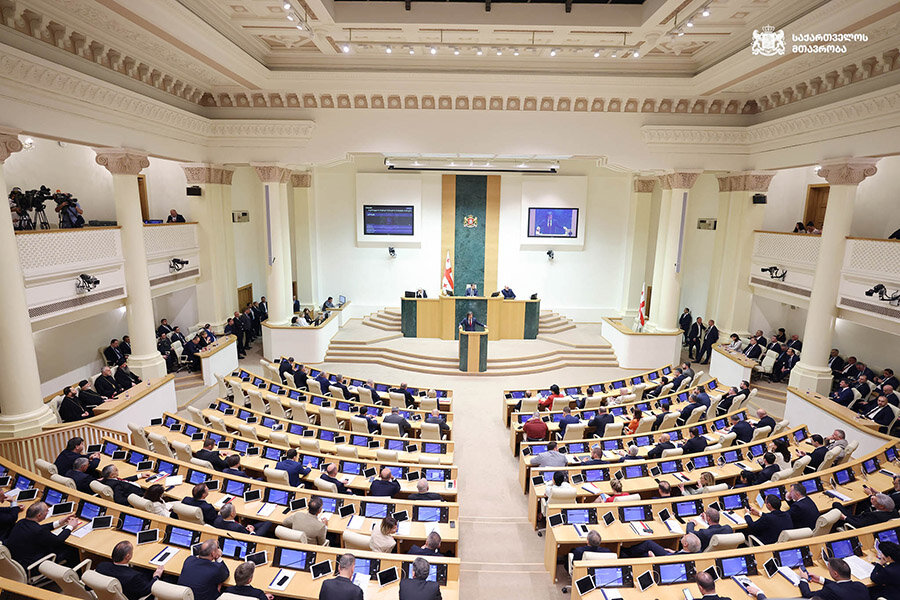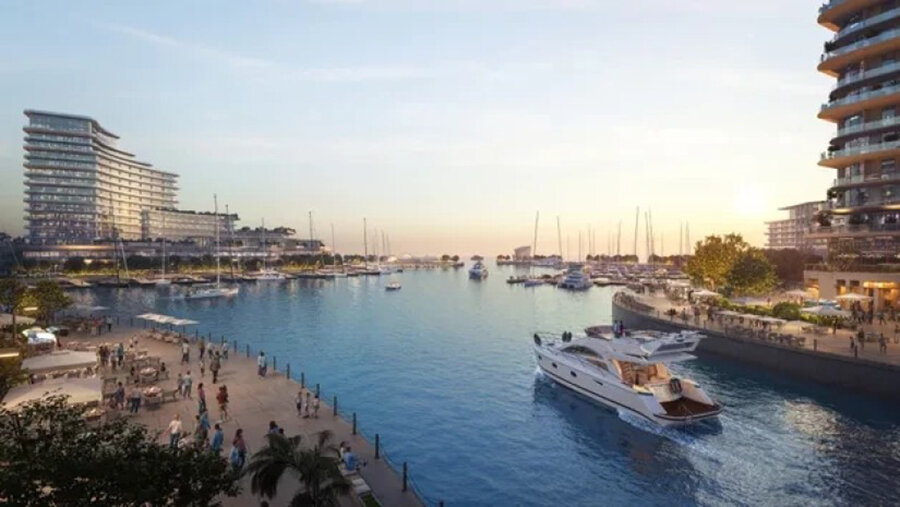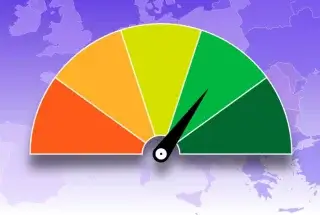read also
Вusiness / Real Estate / Investments / Tourism & hospitality / Analytics / News / Georgia 07.07.2025
Georgia’s Economic Surge and Ambitious Plans: Annual Report by the Prime Minister

Photo: www.gov.ge
Georgia’s Prime Minister Irakli Kobakhidze delivered his annual report to parliament, presenting the government’s results and future plans. He highlighted record economic growth, a significant reduction in poverty, and large-scale infrastructure projects that aim to transform Georgia into one of the region’s key transit and investment hubs.

Reducing Poverty and Growing Prosperity
Over the past three years, Georgia has created 185,000 new jobs, including 68,000 in 2024 alone. The unemployment rate has fallen to a record low of 13.9%, compared to 26.7% in 2012. “Our goal is to reduce unemployment below 4% by 2028, creating an additional 200,000 jobs,” noted the Prime Minister. The average salary in the first quarter of 2025 reached GEL 2,170, with plans to increase it to GEL 3,500 by 2028.
The Prime Minister reminded that in 2012, over 1.1 million people lived below the poverty line at a rate of 30%, whereas by 2024, poverty dropped to 9.4%, reaching a single-digit figure for the first time. In 2024 alone, 90,000 people rose out of poverty. “We cannot be satisfied until poverty reaches zero, but our goal for 2028 is to reduce it below 4%,” emphasized the head of government.
Support for Entrepreneurship and Investment Projects
Irakli Kobakhidze highlighted large-scale business programs as one of the key growth drivers. Under the “Entrepreneurship in Georgia” program, support was provided to 1,500 companies, creating over 10,000 jobs. Through state guarantee schemes, 292 projects for 267 companies were financed, providing employment for 3,300 people. Startup programs, tax benefits, and training for entrepreneurs are actively developing, with projects financed in artificial intelligence, phages, and agritech.
The Prime Minister paid special attention to the investment project by Emaar Group from the UAE: over five years, the company will invest $6 billion in Georgia. Massive developments are planned across 590 hectares in Tbilisi along the banks of the Kura River, featuring parks, new residential buildings, retail outlets, and a premium spa center. On the Black Sea coast, in the Gonio district of Batumi, the Gonio Marina complex will be built, covering 260 hectares. The project includes residential buildings, luxury hotels, shopping centers, parks, and a yacht marina.

“Such investments will significantly strengthen the economy and allow us to achieve new levels of growth,” emphasized Irakli Kobakhidze.
Tourism as a Growth Driver
Tourism revenues reached a record $4.4 billion in 2024. Georgia welcomed 7.4 million tourists, with 70 hotels opened, adding 3,300 rooms and 6,700 beds. By 2028, over 300 new hotels are planned, adding more than 38,000 beds, with investments exceeding GEL 2 billion.
Airports set a record by serving 7.4 million passengers—the highest figure in Georgia’s independent history. Large-scale projects are underway in this sector.
In Vaziani, near Tbilisi, construction began on a new international airport capable of handling at least 18 million passengers annually, while the current airport is designed for only 4 million. Preparatory work has already started: this year will see the selection of a partner, and next year, a company will be established to implement the project. The airport is planned to be relocated to Vaziani by 2031, improving the country’s connectivity and stimulating tourism development.
In Kutaisi, the goal is to increase passenger traffic from 2 million to 5 million annually. As part of a GEL 350 million investment, construction began on a new 3.5-kilometer runway. The number of aircraft parking stands will increase from 11 to 17, allowing larger passenger and cargo planes. This year will see the start of construction on a modern passenger terminal, a key facility for the development of the Imereti region and the entire country. These projects, as the Prime Minister noted, aim to enhance Georgia’s role as a transit hub between Europe and Asia.
Transport Revolution and Strategic Roads
During the reporting period, 437 kilometers of international and domestic roads were renovated, and 84.4 kilometers of highways were opened—more than the previous administration built in nine years (68 kilometers). The Prime Minister emphasized that 367 kilometers of highways have now been completed, including 70% of the East-West Highway (EWH). In the coming month, the 6.4-kilometer Surami bypass will open, and by year-end, the remaining 4-kilometer section of the Rikoti highway will be completed, fully implementing the so-called “Project of the Century.”
By the end of 2026, the Samtredia bridge construction should be finished. In December, the first 6-kilometer section of the Samtredia–Grigoleti road will be commissioned, followed by the second section in May next year. The remaining 3-kilometer Grigoleti–Kobuleti section will be completed by the end of this year. Preparatory work has started on the challenging Batumi–Sarpi section.
Simultaneously, preparations are underway for highways connecting Georgia to the borders of Azerbaijan and Armenia—the Tbilisi–Sadakhlo and Tbilisi–Red Bridge sections. Work will start by the end of this year and should be completed within three years, by 2028. On the Lars route, a unique 9-kilometer tunnel has been drilled on the Kveshe–Kobi road. By the end of this year, a 12-kilometer section from Kveshe to Gudauri is expected to be completed, and the entire 25-kilometer section by the end of next year.
In rail transport, the modernization project is nearing completion: network capacity will increase from 27 million tons to 48 million tons. The Baku–Tbilisi–Kars railway project is almost entirely completed—98.5% finished.
Tunnel and Multi-Lane Highway to Be Built Between Tbilisi and Mtskheta
International Relations and Strengthening Partnerships
The Prime Minister emphasized that one of the government’s key priorities remains the development of international relations. “For this purpose, visits were made to regional countries, Central Asia, the United Arab Emirates, and Hungary. As you know, Hungary is one of our main European supporters for EU integration. We aim to expand ties in all directions and actively participate in international summits,” said Irakli Kobakhidze.
Political and economic relations with China are deepening. A strategic partnership agreement was signed, and further cooperation will continue. Irakli Kobakhidze called the United States one of Georgia’s key priorities: “We publicly announced our readiness to restore our strategic partnership with the US based on a concrete roadmap that would benefit both countries.” Recent changes, including the appointment of a new Georgian ambassador to the US, are expected to facilitate a reset in relations.
Separately, the head of government commented on relations with the EU, where there are significant challenges, “as European bureaucracy often demonstrates an unfair approach.” However, Georgia remains committed to further integration. “Our goal is to become a full EU member by 2030, and if there is a fair approach, nothing will stop us,” said the Prime Minister. He also confirmed Georgia’s commitment to cooperation with NATO.
Progress and Development Prospects
The Prime Minister declared that the country’s economy shows impressive momentum: “In 2024, economic growth reached 9.4%, and in the first months of 2025, it stood at 8.8%. Preliminary figures for May are also very positive, allowing us to say that we will not only meet but exceed economic growth forecasts.” He recalled that since 2020, GDP per capita has increased from $4,300 to $9,140 and is expected to surpass $10,000 for the first time by the end of 2025.
“In 2012, Georgia’s GDP did not even reach GEL 28 billion, and today the economy will exceed GEL 100 billion for the first time—we have nearly quintupled the economy over these years,” emphasized Irakli Kobakhidze. He also added that Georgia aims to rank among the top three countries with the lowest corruption levels, noting the rejection of direct state asset sales and full transparency of government acts. Optimization in state enterprises has saved over GEL 60 million annually.
According to IMF forecasts, from 2025 to 2030, Georgia will maintain its leadership in growth rates not only in the region but also among European countries. An average growth of 5.2% is projected, but the Prime Minister expressed confidence that actual figures will be even higher.
Подсказки: Georgia, economy, prime minister, investments, tourism, infrastructure, Tbilisi, Batumi, business, regional hub, Caucasus








